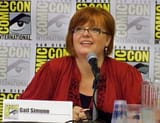Search Results
6/12/2025, 9:14:44 PM
Much of Gail Simone’s popularity comes from the 1990s, when she attacked male comic writers for putting superhero girlfriends in harm’s way, coining the term “fridging.” Now she’s bragging about the term being added to the dictionary on BlueSky in a retrospective on feminism after the comic industry collapse.
Comic books have been in a dismal state of sales for the last decade or more, largely because the storylines stopped being fun and mattering. Marvel and DC Comics set up a duopoly in the United States after decades of flooding the shelves to squeeze out competitors, leaving the big-2 as the only ones left standing that drew readers to a decreasing market of specialty shops.
Most fans wanted to see their beloved superheroes continue their adventures, but in the mid-2010s, readers saw them replaced with a black, female Iron Man, female Thor, black-hispanic Spider-Man, gay Superman, and more as a new crop of writers took over, forming a whisper network of those who bowed to identity politics first before storytelling. The industry collapsed as a result and hasn’t recovered, even though some gimmicks such as the Absolute DC Universe and Ultimate Marvel Universe are keeping the companies afloat in the short term.
How did the industry get to this point? It began in the 1990s when feminists started questioning superheroes, traditionally books aimed at teenage boys, and trying to rewrite the industry to find a new, modern audience. While the 1990s went to their excesses in edginess and violence as well as over-the-top sexuality, it was geared at a teenage boy market competing with ever-increasing movies and video games in the same vein.
Comic books have been in a dismal state of sales for the last decade or more, largely because the storylines stopped being fun and mattering. Marvel and DC Comics set up a duopoly in the United States after decades of flooding the shelves to squeeze out competitors, leaving the big-2 as the only ones left standing that drew readers to a decreasing market of specialty shops.
Most fans wanted to see their beloved superheroes continue their adventures, but in the mid-2010s, readers saw them replaced with a black, female Iron Man, female Thor, black-hispanic Spider-Man, gay Superman, and more as a new crop of writers took over, forming a whisper network of those who bowed to identity politics first before storytelling. The industry collapsed as a result and hasn’t recovered, even though some gimmicks such as the Absolute DC Universe and Ultimate Marvel Universe are keeping the companies afloat in the short term.
How did the industry get to this point? It began in the 1990s when feminists started questioning superheroes, traditionally books aimed at teenage boys, and trying to rewrite the industry to find a new, modern audience. While the 1990s went to their excesses in edginess and violence as well as over-the-top sexuality, it was geared at a teenage boy market competing with ever-increasing movies and video games in the same vein.
Page 1
